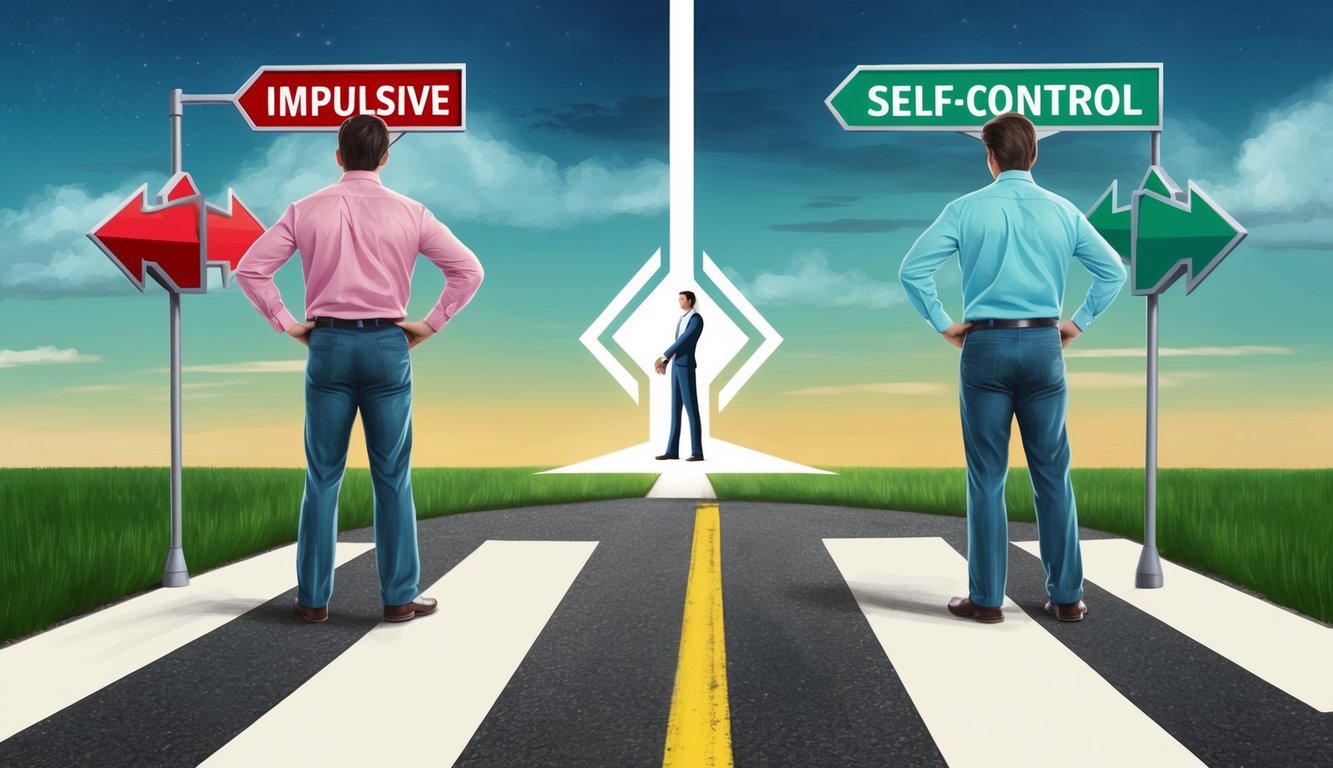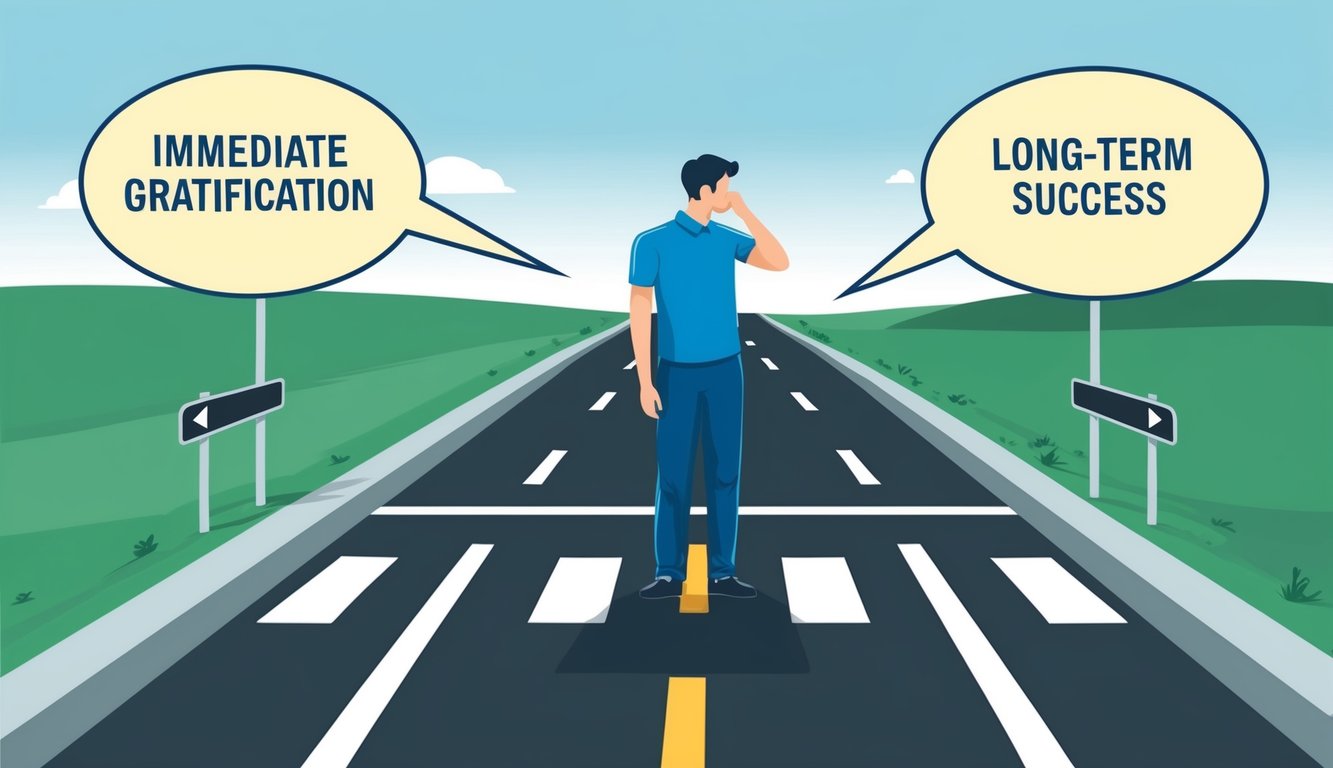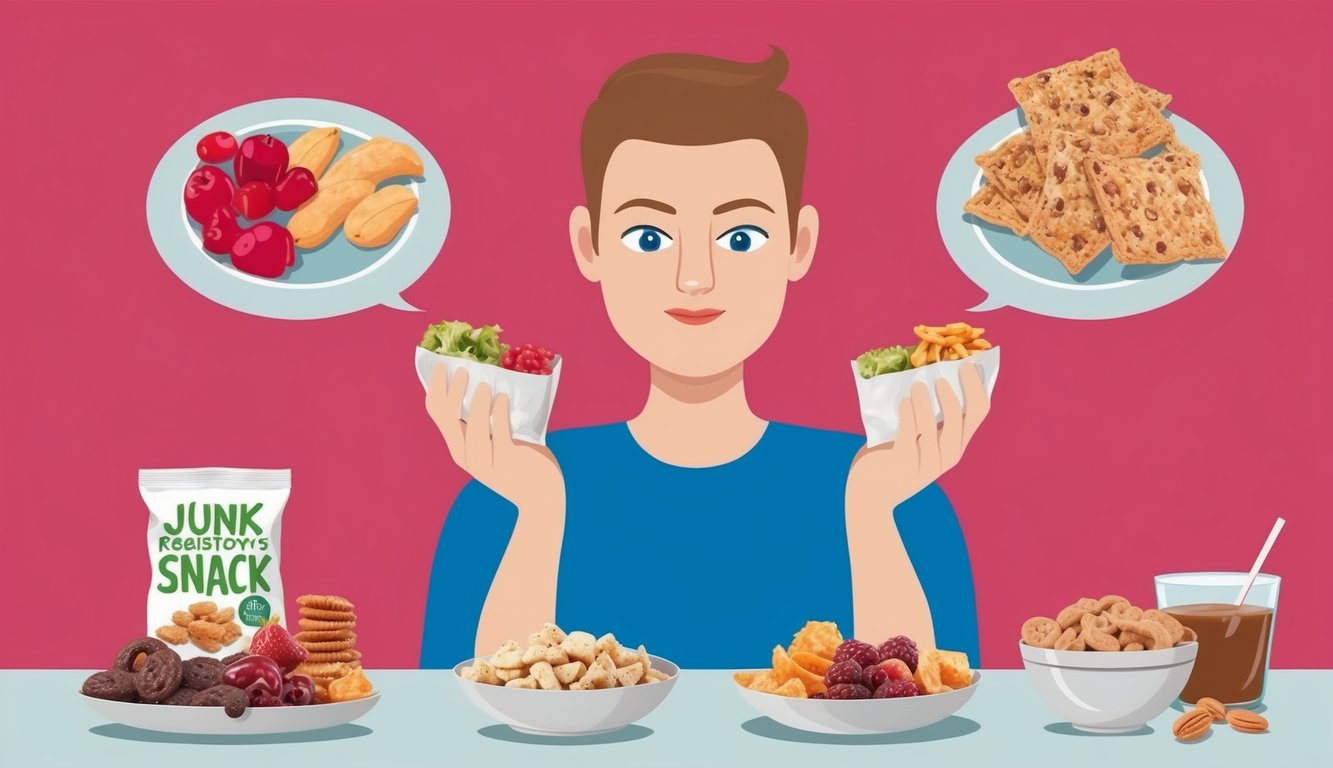If you’ve ever found yourself acting without thinking or saying things you later regret, you’re not alone. Impulsive decisions can affect relationships, work, and everyday life.
You can learn how to control your impulses with practical techniques and thoughtful habits, making it easier to pause and choose healthy actions over automatic reactions.
Awareness is the first step toward change. Recognizing triggers, understanding what drives your impulses, and developing strategies such as mindfulness and deep breathing can help you build more self-control. With steady practice, small changes will add up to noticeable results.
Finally Finish What You Start
You don’t need more information. You need the accountability to execute.

Key Takeaways
- You can identify and better manage your impulses with proven methods
- Practical strategies help prevent impulsive reactions in daily life
- Building impulse control takes awareness, practice, and self-care

Understanding How to Control Your Impulses
Impulses are automatic reactions that can influence your choices and actions before you fully think them through. Learning about the mechanisms behind these reactions, the importance of self-control, and examples of impulse-driven behavior can help you navigate everyday challenges more effectively.
What Are Impulses?
Impulses are immediate responses or urges to act in a certain way, often without premeditation. These can be triggered by emotions, sensory input, or environmental cues. For example, you might feel an urge to check your phone during a meeting or to eat a snack late at night, even if you’re not hungry.
Impulse control is the ability to pause before acting on these urges. It involves your brain’s executive functions, especially in areas like the prefrontal cortex, which helps with decision-making and emotional regulation. Problems with impulse control are common in conditions such as ADHD, certain mood disorders, and some impulse control disorders.
Not all impulses are negative, but trouble managing them can lead to difficulties in relationships, work, and mental health. Recognizing an impulse is the first step in responding to it thoughtfully instead of automatically.
The Role of Self-Control
Self-control, also known as inhibition, is your ability to manage impulses, emotions, and behaviors to reach longer-term goals. Successful self-control allows you to pause, evaluate the consequences, and make choices that align with your values and objectives rather than giving in to immediate desires.
Developing self-control is a gradual process that benefits from consistent practice. Techniques such as setting clear goals, using reminders, and practicing mindfulness can help strengthen your self-regulation skills. Studies show that improving self-control helps with areas like healthier eating, saving money, and making better decisions for your well-being.
Self-control and impulse control are closely related, but self-control emphasizes your proactive engagement in making decisions, while impulse control focuses more on managing automatic reactions. Both are essential for effective self-regulation and mental health.
Common Impulsive Behaviors
Impulsive behaviors cover a wide range of actions that occur without much thought or planning. Examples include interrupting others, making purchases on a whim, overeating, or acting aggressively when frustrated. These behaviors may seem minor at first, but they can build into patterns that negatively affect your life.
Some people experience more intense or frequent impulsivity due to underlying impulse control disorders, substance use, or mental health issues like ADHD and bipolar disorder. Typical impulsive behaviors are often linked with immediate gratification, which can be tempting but may have negative long-term outcomes.
You might notice impulsive actions in everyday life, such as speaking without considering potential impact or giving in to cravings even when you have other priorities. Understanding and identifying these behaviors is crucial for developing strategies to manage them and improve your overall self-control.
Recognizing Symptoms of Poor Impulse Control

You may notice poor impulse control if you struggle to regulate your emotions, make rushed decisions, or act without thinking about consequences. Patterns such as sudden aggression or compulsive behaviors often signal underlying difficulties with self-control.
Emotional and Physical Signs
Common emotional symptoms include feeling easily frustrated, anxious, or restless. You might also notice frequent mood swings or overwhelming urges that are hard to resist. Persistent anger, impatience, or irritability can affect your daily functioning.
Physical manifestations may appear as fidgeting, clenching fists, pacing, or difficulty sitting still when faced with strong impulses. Some individuals experience a surge of tension or excitement before acting impulsively, followed by regret or guilt. Certain behaviors may escalate into more severe actions, such as unplanned aggression or risky activities.
Recognizing these signs allows you to identify patterns. This self-awareness is the first step toward managing your reactions more effectively.
Impact on Relationships
Poor impulse control can significantly disrupt your relationships with family, friends, or coworkers. You might notice frequent conflicts, arguments, or misunderstandings due to unpredictable behavior.
Aggressive reactions, such as shouting or physical outbursts, can erode trust and emotional safety in close connections. Impulsive decisions—like making hurtful comments or acting out of jealousy—may push others away.
When impulsive actions result in broken promises or risky behaviors, those around you may feel disappointed or unsafe. Over time, this can cause isolation and damage your support system, making it more challenging to maintain healthy social bonds.
Associated Disorders
Symptoms of poor impulse control often overlap with specific mental health conditions. Disorders such as intermittent explosive disorder, which involves recurrent aggressive outbursts, are directly linked to difficulty managing impulses.
Other related conditions include kleptomania, a compulsion to steal, and pyromania, an urge to start fires. Impulse control can also be affected by bipolar disorder, where episodes of mania may increase reckless or impulsive behaviors.
If you recognize these patterns alongside mood instability or compulsive urges, it may be a sign to seek professional guidance for a comprehensive evaluation.
Root Causes of Impulsive Behavior

Multiple factors can contribute to impulsivity. These include biological makeup, life experiences, and the presence of certain mental health conditions.
Biological Factors
Brain structure and chemistry play a significant role in how you control impulses. Key areas like the prefrontal cortex help regulate decision-making and self-control. When this part of your brain functions differently, you may find it harder to pause before acting.
Neurotransmitters, such as dopamine and serotonin, are chemicals that influence mood and behavior. Imbalances in these chemicals can make impulsive reactions more likely. Hormonal variations can also impact your ability to think through the consequences before acting.
For some people, genetics can predispose them to have weaker impulse control. Research has found that a family history of mental health conditions, such as bipolar disorder or ADHD, can increase your risk of struggling with impulsivity.
Environmental Influences
Your environment and upbringing shape how you learn to manage impulses. Growing up in a stressful or unstable home—especially with frequent arguments, parental neglect, or financial hardship—can make it tougher to develop healthy coping skills.
Examples of environmental factors:
- Exposure to traumatic events or chronic stress
- Lack of consistent rules or supervision during childhood
- Peer pressure in social settings
Substance use and certain risky behaviors are more common in environments lacking support or structure. Early exposure to drugs or alcohol can weaken your impulse control over time, making impulsive behaviors more frequent or severe.
Role of Mental Health Conditions
Many mental health conditions are linked to problems with controlling impulses. Disorders such as impulse control disorders, ADHD, and bipolar disorder can make it hard to resist urges or delay gratification.
Bipolar disorder, for example, is marked by mood swings that can lead to reckless decision-making or risky actions during manic episodes. Impulse control disorders like kleptomania or intermittent explosive disorder create patterns of repeated actions despite negative consequences.
It’s also common for people with anxiety, depression, or substance use disorders to display impulsive behaviors. Proper diagnosis and treatment of these underlying conditions are often necessary to help you regain control over your actions. For more on symptoms and causes, see this overview of impulsive behavior.
Effective Strategies to Control Your Impulses

Impulse control relies on more than just willpower. The most effective approaches combine practical coping skills, mindful awareness, and structured therapy techniques to help you respond thoughtfully instead of reacting automatically.
Developing Coping Skills
Building strong coping skills helps you manage impulsive urges in daily life. Start by identifying your personal triggers—these could be stress, boredom, or specific environments.
Use tools like journaling to track situations where your impulses are strongest. Being aware of your patterns allows you to prepare strategies for the next time.
Develop healthy outlets for impulse energy, such as exercise, listening to calming music, or channeling energy into a hobby. Setting clear routines can also make it easier to pause before acting on impulse. Sometimes, avoiding known triggers or high-risk situations is an effective short-term solution for maintaining control.
For more suggestions on creating alternate outlets and limiting risky situations, visit these ways to manage impulsive behavior.
Practicing Mindfulness
Mindfulness encourages you to observe your thoughts and feelings without judgment. This increased self-awareness helps you spot urges as they arise, giving you a chance to pause and choose a different action.
To get started, try brief breathing exercises or guided imagery sessions when you notice an impulse. If you are new to mindfulness, even a few minutes a day can help. Focused attention on the present moment often decreases the intensity of impulsive feelings.
Techniques such as meditation or mindful walking can be practiced anywhere. Over time, these habits improve your emotional regulation, making you less likely to act impulsively. For more mindfulness-based techniques, read about these tips for taming impulsivity.
Cognitive Behavioral Therapy Approaches
Cognitive Behavioral Therapy (CBT) is a structured, evidence-based treatment that helps you recognize the connection between your thoughts, emotions, and actions. In CBT, you learn to identify unhelpful thought patterns that trigger impulsive behaviors and replace them with more constructive responses.
CBT sessions often use role-play or situation analysis to practice new skills. Therapists may teach you how to pause, reframe a thought, and choose a behavior that aligns with your goals. Homework assignments and activity schedules make new behaviors part of your routine.
Medications might sometimes be considered alongside CBT, particularly for impulse control issues linked to conditions like ADHD. For more detailed information about therapy and behavioral strategies, explore this overview for managing behavioral triggers.
Managing Stress to Prevent Impulsivity

Stress can quickly erode your ability to think clearly and act with self-control. By understanding how stress affects your mind and using concrete strategies, you protect your impulse control and support your overall mental health.
Stress-Reduction Techniques
Reducing stress is a critical step in managing impulsive behavior. Regular mindfulness practices, such as deep breathing and guided meditation, help lower stress hormones and increase mental clarity. Setting aside just five minutes each day for these exercises can make your thoughts less reactive and more deliberate.
Physical activity is another proven strategy. A brisk walk, stretching, or even light yoga can cut down tension and restore your focus. These actions generate endorphins that improve mood and create a protective buffer against impulsive decisions.
It also helps to limit triggers like caffeine or chaotic environments that ramp up stress. Organize your space, keep a stable routine, and avoid multitasking. When possible, address issues before they escalate to prevent emotional overload. For more techniques, see practical stress management tools.
Emotional Regulation
Learning to regulate your emotions is essential for impulse control. If you’re feeling overwhelmed, take a moment to label and acknowledge your emotions rather than reacting immediately. This pause helps you move from reflexive actions to thoughtful choices.
Journaling, using a mood tracker app, or simply talking things through can clarify what you’re feeling. When your emotions are clear, you’re less likely to be swept up by urges or regret a hasty decision.
Grounding techniques like the 5-4-3-2-1 method—where you focus on your senses—can be effective in moments of stress. By engaging your senses, you anchor yourself in the present and regain some control over your responses. According to guidance from psychologists, building a habit of emotional regulation can shut off harmful or negative thoughts that drive impulsive actions.
Seeking Support
Sometimes, stressors and impulsivity are too difficult to handle alone. Reaching out to trusted friends, family, or a psychologist gives you an external perspective and emotional relief. Support systems can reinforce your strategies or offer new tactics you haven’t tried.
Group support, such as joining a stress-reduction class or therapy group, can also improve your coping skills. Many find value in structured programs led by mental health professionals who understand the interplay among stress, mental health, and impulse control.
If you notice that stress and impulsive actions are disrupting your daily life, consider scheduling a session with a psychologist or counselor. Professional support can help you establish sustainable routines and personalized techniques for stress and impulse management. For more, visit Talkiatry’s guide to impulse control.
Impulse Control in Everyday Life
Impulse control can influence how you communicate, solve problems, and build trust with others. In both personal and professional settings, strengthening this skill helps you make thoughtful decisions and avoid unnecessary conflict.
Improving Relationship Dynamics
Managing impulsiveness is essential for healthy relationships and effective parenting. When you pause before reacting, you can avoid saying things you regret or making quick judgments that hurt your partner. Using strategies like deep breathing or counting to ten helps increase your self-control during arguments or stressful moments.
Listening to your partner and considering their perspective before responding also fosters mutual respect. Setting aside time to reflect on patterns of impulsive behavior—such as interrupting or making abrupt decisions—can give you insight into triggers. You might find it helpful to journal your reactions or discuss patterns with a therapist.
Consistency in these practices strengthens trust and fosters a more supportive environment for both partners and children. In parenting, modeling impulse control teaches your child how to manage frustration, delay gratification, and resolve conflicts peacefully. By practicing and demonstrating these skills, you support healthier relationship dynamics in your home.
Workplace and Social Settings
In the workplace, impulse control allows you to respond to challenges calmly and thoughtfully. Taking a moment to write down your thoughts or step away from stressful situations can prevent rash replies to colleagues or supervisors.
Effective impulse management is key during meetings or group discussions. Practicing active listening, waiting your turn to speak, and thoughtfully considering your responses promote better communication and teamwork. Using a simple checklist to evaluate the consequences before acting can help keep your decisions in line with long-term goals.
Socially, strong impulse control supports reliable friendships and helps you avoid misunderstandings. By resisting the urge to react immediately to criticism or disagreements, you maintain a balanced and respectful interaction with others. Staying mindful of your triggers and practicing self-reflection after social interactions builds your ability to navigate social and professional settings with more confidence and composure.
When to Seek Professional Help
There are certain signs and patterns that signal it may be time to involve a mental health expert. Timely support from professionals, along with structured treatment plans, can improve your ability to manage impulses and reduce distress.
Red Flags to Watch For
If your impulses are leading to repeated harm—such as financial loss, relationship conflict, or legal trouble—it’s important to consider outside help. These consequences may signal an underlying issue like an impulse control disorder.
Look for patterns that disrupt daily life, such as frequent aggression, compulsive stealing, or inability to resist urges despite negative outcomes. Other warning signs include feeling distressed, helpless to stop, or experiencing shame and secrecy about your actions.
When family or friends express concern about your behaviors, or when you notice loss of control even after attempts to change, these are serious indicators.
Working with a Psychologist
A psychologist can help you understand the roots of your impulsive behaviors and work with you to develop stronger coping skills. During sessions, they assess your symptoms, offer diagnosis if needed, and suggest personalized interventions.
You may participate in talk therapy, such as cognitive behavioral therapy, which targets the thoughts and patterns driving your impulses. Psychologists may also recommend family therapy, group sessions, or behavior modification programs based on your situation.
The process often involves setting specific goals, tracking progress, and learning strategies to pause before acting. Collaboration with a psychologist helps you identify triggers and practice new responses in a supportive, non-judgmental setting.
Treatment Plans and Resources
Treatment is tailored to your symptoms and may involve several approaches. Cognitive behavioral therapy (CBT) is commonly used and has been found to be highly effective for impulse control disorders. CBT teaches you how to reframe thoughts and build lasting habits.
In some cases, medications such as selective serotonin reuptake inhibitors (SSRIs) or mood stabilizers may be prescribed to reduce impulsivity or manage co-occurring mental health conditions. Your provider may discuss these options if therapy alone is not enough.
Access to resources like support groups, digital monitoring tools, and educational materials can further aid your recovery. For specific guidance and resources, see information from Healthline or reach out to a local mental health professional.
Long-Term Tips for Building Self-Control

Building self-control is a gradual process. You can improve impulse control and coping skills by focusing on small, sustainable changes in daily habits.
Setting Realistic Goals
Set clear, attainable goals to develop self-control over time. Trying to change everything at once often leads to frustration and losing motivation. For the best progress, break big objectives into smaller, manageable steps.
Use the SMART goal framework—make goals Specific, Measurable, Achievable, Relevant, and Time-bound. For instance, instead of saying “I want to eat healthier,” aim for “I will bring a homemade lunch to work three times a week for the next month.”
Celebrate small achievements to reinforce positive behavior. As studies suggest, even modest milestones can boost your confidence and make it easier to stick to new habits. Avoid perfectionism and focus on steady progress.
Write your goals down or use a digital tracker to keep them visible. This constant reminder keeps your efforts on track when temptations arise.
Creating Supportive Environments
Modify your environment to encourage better self-control. Reducing exposure to triggers makes it easier to manage impulses. For example, if you’re trying to avoid junk food, don’t keep it in your house.
Surround yourself with people who support your goals. Research shows that social support can significantly improve your chances of building self-regulation skills. You might consider sharing your goals with friends, family, or a support group for added accountability.
Use cues and reminders to prompt positive behaviors. For instance, place a book on your nightstand to encourage reading instead of mindless scrolling. Rearranging your workspace to minimize distractions is another effective strategy.
Plan ahead for challenging situations. Use coping strategies, such as taking deep breaths or briefly removing yourself from a tempting scenario, to strengthen your impulse control. More ideas for creating effective environments can be found in this guide on maximizing self-control.
Tracking Progress
Monitor your self-control journey to identify patterns and sustain motivation. Keeping a journal or using an app to log your actions can reveal triggers and trends you may not notice otherwise.
Record not just successes but also slip-ups. Review what led to a lapse and how you responded, then adjust your coping skills for future challenges. Tracking progress helps you see concrete improvements over time, even if they seem small day-to-day.
Set regular check-ins—weekly or monthly—to review your progress. Visual aids like charts or lists are helpful for quickly seeing growth and areas that need more attention. Consistently tracking your actions reinforces lasting change.
If you notice you’ve stalled, reassess your goals and strategies. Experiment with new approaches so you continue building strong self-control and impulse regulation skills.
Frequently Asked Questions
What strategies can adults use to manage their impulsive behaviors?
Practice identifying urges before acting by taking a moment to pause and think about your next step. Mindfulness exercises, such as deep breathing or brief meditation, help you create distance between impulse and reaction. Regular self-reflection helps you track triggers and patterns over time.
In relationships, what methods help to reduce impulsiveness?
Establishing open communication and setting shared boundaries reduce misunderstandings and rash decisions. Discussing expectations and taking breaks during conflict can help both people regain composure before responding. Agreeing on signals or time-outs makes it easier to pause and reflect during emotional moments.
What are effective techniques to improve impulse control in individuals with ADHD?
For people with ADHD, scheduled routines, organizing tasks with reminders, and using external prompts are key strategies. Mindfulness practices, such as naming urges and tracking emotions, can also strengthen self-awareness. You may benefit from keeping a journal of impulsive moments to identify patterns and find the most challenging triggers. Explore more about managing impulsivity with ADHD.
Which coping skills are best for managing impulsivity?
Deep breathing, counting to ten, and brief meditation are techniques that calm the mind before you act. Setting small, immediate goals can keep you grounded in the present. Regularly practicing mindfulness and self-monitoring can make you more aware of urges as they arise. Consider reading about coping skills for impulsiveness.
How can emotional impulsiveness be regulated successfully?
Identifying emotions as they occur and naming them out loud helps you step back from your automatic reaction. Creating a daily routine that incorporates relaxation activities can reduce emotional instability. You can also benefit from structured problem-solving methods, such as writing down options before making decisions or seeking advice from a trusted friend in the moment.






